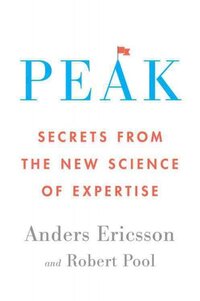What I’m Reading Now
 When I drive I listen to books on CD (free from my local library). Dh listens to NPR. He recently heard this review of PEAK: SECRETS FROM THE NEW SCIENCE OF EXPERTISE, by Anders Ericsson and Robert Pool. He ordered the book, handed it to me, and said, “I think this is your kind of thing.”
When I drive I listen to books on CD (free from my local library). Dh listens to NPR. He recently heard this review of PEAK: SECRETS FROM THE NEW SCIENCE OF EXPERTISE, by Anders Ericsson and Robert Pool. He ordered the book, handed it to me, and said, “I think this is your kind of thing.”
It is. Ericsson and Pool recall for us Malcolm Gladwell’s OUTLIERS, the book that famously insists on a 10,000 hour rule for mastery, and while they agree with some of its aspects, they also masterfully refute it. 10,000 hours is not magic. (In fact, they share one example of 200-hour mastery.)
Deliberate Practice is their mantra.
This chimes with lessons I’ve learned from my own practice — it chimes with advice from my dedicated writer and teacher friend Priscilla Long (advice you can now possess merely by purchasing her new book, MINDING THE MUSE).
Even though I’ve heard some of it before, the book managed to blow my mind. Ericsson and Pool have studied so-called geniuses for thirty years. They have gleaned history for the details that lay behind the myths of genius (including Mozart’s) and they have worked with experts in lab settings (particularly with people working on feats of memory). They re-examine phenomenons such as perfect pitch, and draw from the worlds of chess and track-and-field to demonstrate that inherent talent is often not for a particular field, but for the willingness to practice purposefully and persist in that field. Yes, body type matters, and maybe IQ matters (at least to an extent), but it’s more than that. Long story short, it has to do with recognizing the parts of one’s practice, learning to recognize in which parts one is deficient, correcting that deficiency, and moving forward. Having a teacher or coach helps, but as Ericsson and Pool show us, not all teachers and coaches provide this sort of insight. And when they do, they often concentrate their efforts on the top performers. So, guess who gets better? It isn’t because they are the top performers, but because they have been enabled to recognize their deficiencies, correct them, and continue practicing, deliberately…
Well, I’ll let you go to the NPR review (which is in part an interview, and linked to an excerpt).
PEAK’s authors do not so much address themselves to writing, but what they are saying can easily be applied to writing.
Exercising is a good analogy for writing. If you’re not used to exercising you want to avoid it forever. If you’re used to it, it feels uncomfortable and strange not to. No matter where you are in your writing career, the same is true for writing. Even fifteen minutes a day will keep you in the habit. –JENNIFER EGAN
Practice, the right kind of practice, changes your brain. We know this. Ericsson and Pool propose that understanding this concept more fully, more in depth, can change the way we think about our own “innate” abilities, the way we acquire expertise, the way we teach children, and — no pressure here — the whole world.

Hi I read your poem – pretty deep for me – it’s something I have absolutely no ability to write – but just the same I loved it and congratulations. I read you are on Twitter so I went there too since James is cleaning and I have a cold I have time to go anywhere I want on the web. So I enjoyed catching up on your blog and now twitter. Congratulations on 37 submissions.
Thank you for reading with me!
On Thu, Dec 15, 2016 at 1:54 PM, A Writer's Alchemy wrote:
>